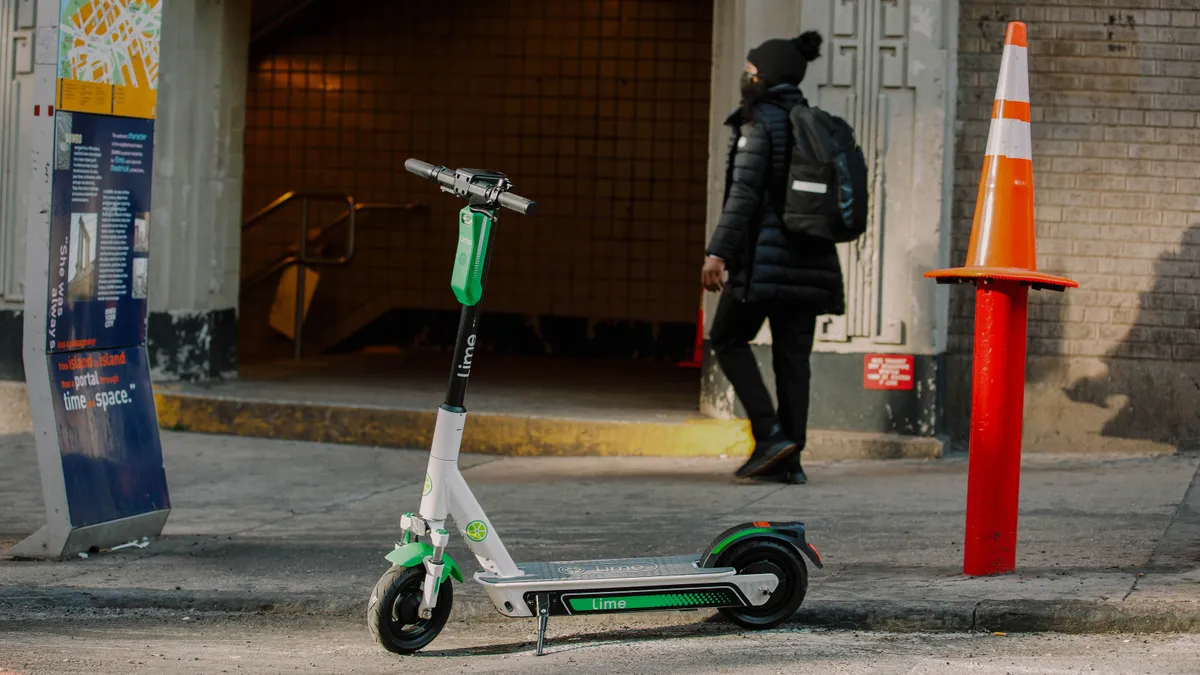Dive Brief:
- Earlier this month, Bird made its public debut after merging with a special purpose acquisition company (SPAC) in a deal that valued the company at $2.3 billion. CEO Travis VanderZanden told Reuters ahead of the debut that the transaction will bring in $414 million, 20% of which will go to launching in new cities.
- Separately, Lime announced the same week it had raised $523 million in convertible debt and loan financing, which the company has said is part of a path to go public next year. Some of that funding will go to decarbonizing the company’s supply chain and rolling out more e-bikes and scooters.
- The micromobility industry is poised for further growth in the years ahead, analysts say. “The fact that the two biggest players are raising hundreds of millions of dollars shows that investors have confidence that shared micromobility is here to stay," said Ryan Citron, micromobility analyst for Guidehouse Insights.
Dive Insight:
Since electric scooter and dockless bike fleets started launching in cities in 2017, the industry has rapidly grown up. An August report from McKinsey & Company found that an estimated 120 shared micromobility companies around the world have collectively raised $9 billion since 2010. The market, the report found, could reach a global consumer spending potential of between $300 billion and $500 billion by 2030, the equivalent of three to four times of the current ride-hailing market. A separate report from Market Research Future, the industry could be worth $255 billion by 2027, up from $35 billion in 2020.
That’s despite a severe drop in ridership during the COVID-19 pandemic when some cities even took vehicles off the streets amid public health concerns. “During the pandemic lockdowns, there was a real concern about whether these businesses could survive,” said Citron.
Citron noted that a key indicator of the industry’s strong future was the fact that companies are working with cities on safety and permitting measures. While the early days of scooter launches were defined by chaos, with thousands of vehicles showing up on sidewalks with no regulations, many fleets are now operating under strict permits from cities, with restrictions on where vehicles can be driven and parked.
Of course, not every company has seen the same success; Skip filed for Chapter 7 bankruptcy in August and other smaller operators have had trouble competing with the more established fleets.
In a statement, Lime CEO Wayne Ting said the latest fundraising round is a “testament to the strong business we’ve built and the overwhelming confidence we’ve received from the financial community” and would “ensure people have reliable access to affordable, shared, carbon-free transportation.” Ting also said the investment, and eventual debut on public markets, would help Lime roll out more of its electric bikes and scooters and introduce other modes of transport.
Bird, meanwhile, says it is operating in more than 350 cities, according to its third-quarter earnings statement. VanderZanden told Reuters that about two-thirds of the money raised from the SPAC merger would go to expanding its operations in those cities, with just 20% to go to new markets, although he said “I don’t think our trend of expanding to new cities is going to slow down.”
Citron, however, said the industry will likely see most of its growth through expanding existing operations. Many “second-tier cities,” he said, may lack the ridership, density and infrastructure to support a full buildout, while existing markets are adding bike lanes and charging docks that make the vehicles easier to use.
“Getting into a new city is an investment in a lot of policy work, legal work, bidding on contracts and infrastructure,” he said. “One of the biggest opportunities is to become a core public transit type of mobility in the view of cities and establish themselves as an important mode.”











